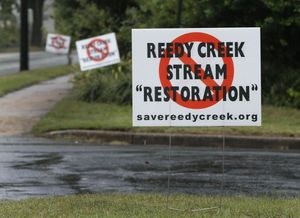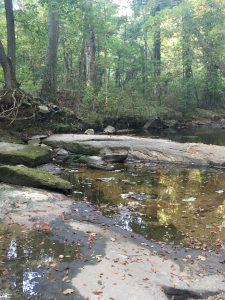We rounded a corner and immediately saw rows of white and red signs opposing the Reedy Creek “Restoration.” We were surely in the right place. Andrew and I pull up in the car and immediately see a bearded man in waders. We knew it had to be Bill Shanabruch. After speaking with him for a few short minutes, he clearly explained his belief that “the project is not a restoration, it’s relocation” and that it “is not going to improve aquatic habitat.” It came as a surprise to learn that the City of Richmond had not performed a stream evaluation to choose the project site. After the failure of the Albro Creek restoration, it would make sense to ensure this kind of destruction to an area does not occur again. The Reedy Creek project is a classic issue between scientists and politicians.
As Parr explains in his post, the city is not taking the issue to heart and is only concerned about reaping the political benefits of a restoration project. The Richmond government receives additional EPA points for stream restorations which drives them toward the decision to continue with the so-called “restoration.” Shanabruch rationalized that the stormwater from the upper part of the creek was the root of the issue and explained that this plan would not solve the problem. The government is drawn to the site we walked through because it is public land and it makes their job a lot easier to not have to deal with as many homeowners and private land in that area.
However, that does not make it right for them to choose a restoration area based on convenience. The project selection area should be a scientific process deliberated by those familiar with the land instead of politicians who are unaware of the adverse effects their ideas could have on the ecosystem. The Reedy Creek Coalition is working to stall the city’s decision until after the election, but the plan should have been more carefully selected rather than having to force the public to speak out against the decision. Hopefully together the city and the public will find a way to save Reedy Creek.


